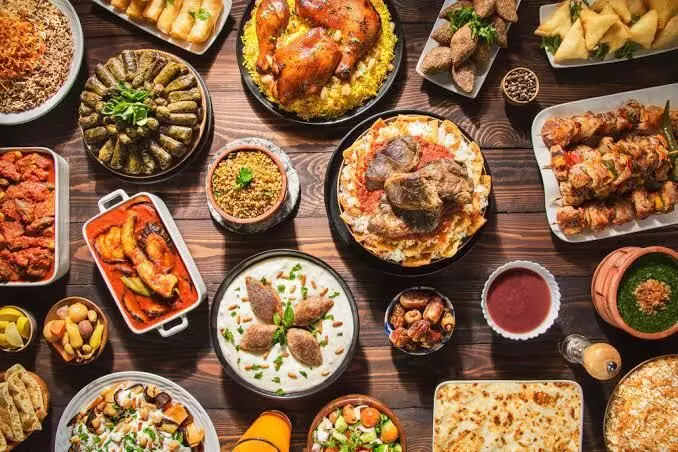Bakr Eid on a plate: How Hyderabad Muslim families preserve generational recipes through food
In an age when YouTube tutorials dominate kitchen culture, Bakr Eid recipes often remain undocumented
By Anoushka Caroline Williams
Bakr Eid on a plate: How Hyderabad Muslim families preserve generational recipes through food
Hyderabad: Every year, as Bakr Eid approaches, the kitchens of many Indian Muslim homes shift into an unhurried rhythm of nostalgia.
The scent of browned onions, ginger-garlic paste and marinated meat carries more than just appetite—it carries memory. Recipes that remain dormant for most of the year begin to reappear: some scribbled in old diaries, others passed on verbally across generations.
“It’s the only time of year I make my mother’s kaleji curry,” said 54-year-old Nazia Begum from Hyderabad. “She taught me how to clean the liver properly, how to slow-cook it with patience, and how much garam masala to add—but only after turning off the flame. It sounds small, but that’s the secret to the taste.”
Recipes that skip the Internet
In an age when YouTube tutorials dominate kitchen culture, Bakr Eid recipes often remain undocumented. They are inherited, not googled. Among them are dishes so specific they’re made in only one household on one day of the year.
“In our family, we make something called ‘gurde ka salan,’ which uses kidney meat in a thin tamarind curry,” said Yahya Ali, a 29-year-old design consultant. “It was my grandfather’s favourite. I didn’t even know it was unusual until I told a friend and she said, ‘You eat what?’”
These dishes don’t always feature on the main Eid table but exist on the fringes—mid-morning kitchen snacks, post-qurbani breakfasts or special plates made for elder relatives. They are not showstoppers, but quiet acts of remembrance.
Across states, a shared sentiment
Though ingredients and styles change across regions—from Kolkata’s rezala to Hyderabad’s bhuna kaleji—the underlying emotion is similar: food as a vessel for memory.
Mira Rahman, who grew up in Lucknow but now lives in Hyderabad, still follows her dadi’s recipe for sheer qorma with a slight variation. “We fry dates in ghee and then use that ghee in the vermicelli. No saffron, no cardamom. It’s a very bare version, and it tastes like home.”
In Kerala, where Bakr Eid is called Perunnal, families often make mutton chaps with coconut milk and whole spices. “My amumma didn’t write anything down,” says Shabnam Basheer, a writer. “So now I try to replicate the dish every year, and every year it tastes different. But that’s part of the ritual.”
Cooking as an act of transmission
Beyond taste, the process of making these recipes is deeply communal. Children are called into the kitchen, not just to assist, but to watch—the unspoken first step in learning. The slow rhythm of these preparations, which often span days, contrasts with the urgency of everyday meals.
“Every Eid, I make my grandfather stand next to me while I cook paya,” says architecture student Nishaaz Khan. “He doesn’t use measurements. He just says things like ‘do it till the smell changes.’ It’s frustrating—but also beautiful.”
These intergenerational kitchen collaborations become moments of intimacy. Amid the clanging of utensils and the waiting for the next boil, stories are shared, corrections are offered gently, and time slows down.
Recipes that disappear
But not all recipes survive. In some households, the death of a family elder means the disappearance of a taste no one quite remembers how to make. A certain biryani masala or sweet dish becomes a memory instead of a meal.
“I wish I had written down my nani’s taftan bread recipe,” said Nishaa. “It was soft but dense, brushed with milk and sesame seeds. We haven’t had it since she passed. None of us can get it right.”
There is grief in that absence, but also urgency. Young people are increasingly choosing to record these recipes—not just on paper, but in videos, Instagram stories, and blog posts.
The future of Eid kitchens
As urban nuclear families become more common and meat preferences change, not all traditional recipes are being preserved. But for many, Bakr Eid remains the one time a year when the kitchen is more than just a place to cook.
“Even if we’re tired, even if we’ve become vegetarians, we still cook these dishes,” said Yahya. “It’s not about the meat. It’s about not letting go of who we were.”
In every slow stir, every intentional garnish, every whisper of “this is how your nana liked it,” the Eid kitchen offers something larger than a meal. It offers continuity.